Understanding the Link: Do K Cups Cause Cancer? Here’s the Truth
You’ve likely relished the convenience of sipping your favorite coffee blend from a K-cup, but ever paused to wonder, “Do K-Cups cause cancer?” It’s a question that’s been brewing in my mind too, so I decided to unpack the science behind it.
K-Cups might be a boon for our rushed mornings, but can they be a bane to our health? There have been murmurs about the potential risks related to the materials used in K-Cups, concerning exposure to harmful elements like Bisphenol A, aluminum, and pesticide residues.
As we venture into this important discussion, we’ll shed light on what’s fact and what’s fallacy. By the end, you will have a clearer understanding about K-Cups and cancer, empowering you to make healthier choices for your cup of joe.
Understanding K-Cups and Their Potential Health Risks
What Are K-Cups and What Materials Are They Made Of?
K-Cups have undeniably simplified the morning coffee routine, providing a fast and convenient way to brew a single cup of coffee. Yet, the materials they are crafted from have sparked widespread discussion. Predominantly, K-Cups are created using various plastics, including the noteworthy #7 plastic, which comprises Bisphenol A (BPA). While Keurig highlights their use of polypropylene—an FDA-approved substance known to be safe for food contact—many remain wary about the true safety profile of these coffee pods, especially regarding potential exposure to harmful chemicals like Bisphenol A (BPA), which you can learn more about [here](https://www.health.mn.gov/communities/environment/risk/chemhazard/bisphenola.html).
Does the Composition of K-Cups Carry any Health Concerns?
One of the primary worries surrounding K-Cups centers on the plastic materials involved in their production. Keurig emphasizes that their K-Cups are BPA-free, yet unsettling research indicates numerous plastic products can still showcase estrogenic activity (EA). EA happens when certain chemicals replicate the hormone estrogen, potentially disturbing the endocrine system. Such disturbances can trigger severe health implications, including early puberty in females, reduced sperm counts in males, and even heightened risks of cancers like breast, ovarian, testicular, and prostate cancers. Distressingly, around 70% of plastic products examined reveal some degree of EA, adding weight to these anxieties.
What does Keurig Say About the Safety of Their K-Cups?
Keurig maintains that their K-Cups, made from FDA-approved polypropylene, are safe and devoid of BPA. Still, the lingering concerns among consumers revolve around the possible estrogenic activity from other chemicals embedded within the plastic. Although polypropylene is generally deemed safe, the combined chemical composition of K-Cups might still harbor risks. The growing body of studies indicating EA in diverse “BPA-free” plastics furthers the skepticism among coffee lovers about the safety of these popular pods.
The Link Between K-Cups and Cancer
Delve into the potential carcinogenic risks associated with K-Cups. Explore the role of materials like BPA, estrogenic activity, and aluminum in everyday usage and their possible impact on your health.

Bisphenol A (BPA) and Estrogenic Activity (EA) in K-Cups
K-Cups, predominantly used with Keurig machines, are often scrutinized for their material composition. While Keurig assures consumers that their K-Cups are BPA-free, the presence of BPA or similar compounds in some plastics remains a concern due to their potential estrogenic activity (EA).
EA involves chemicals that mimic estrogen, potentially leading to significant health risks. This includes disrupting the endocrine system, impacting reproductive organs, contributing to obesity, and increasing the risk for cancers such as breast, ovarian, testicular, and prostate cancers.
Is BPA in K-Cups a Concern for Cancer?
Despite Keurig’s claims that their K-Cups are BPA-free, concerns persist about other EA chemicals found in BPA-free materials. These chemicals can still exhibit EA, behaving like estrogen and potentially increasing cancer risk.
The brewing process inherently involves high temperatures, which can accelerate the leaching of these chemicals. This raises questions about the safety of regularly consuming beverages brewed using these K-Cups, particularly at the high temperatures involved.
Does the Heat from Brewing Release Harmful Chemicals?
When brewing coffee in a Keurig machine, the process reaches approximately 192 degrees Fahrenheit. This high temperature poses a risk for chemical leaching from the plastics used in K-Cups.
Even if the materials used are BPA-free, other compounds that exhibit estrogenic activity could be released. This is concerning because these EA chemicals can enter the beverage consumed, potentially leading to adverse health effects over time.
Understanding the Effects of High-Temperature Brewing
High temperatures can significantly increase the release of EA chemicals from plastics. The combination of heat and boiling liquids elevates the risk compared to other exposure methods, like UV rays.
This means that the typical use of K-Cups in high-temperature brewing might exacerbate the release of harmful chemicals, posing a greater health risk than initially perceived.
Aluminum in K-Cups: Should You be Concerned?
Another worry is the use of aluminum foil in K-Cups. Exposed to high heat and acidic conditions, aluminum could potentially pose health risks.
Notably, there are concerns about its links to mental health issues such as anxiety and depression, as well as neurodegenerative diseases like Alzheimer’s and various cancers.
Exploring the Link Between Aluminum and Health Issues
Hypotheses suggest that chronic aluminum exposure could contribute to neurodegenerative diseases such as Alzheimer’s. While there’s ongoing debate and a need for more research, the chronic ingestion of aluminum might elevate cancer risks.
Understanding and mitigating exposure to aluminum, especially in high-heat conditions like coffee brewing, remains key to reducing potential health impacts.
By exploring the detailed risks associated with BPA, estrogenic activity, and aluminum exposure through the use of K-Cups, consumers can better grasp the complex interplay of factors that may contribute to increased cancer risk. Therefore, it is crucial to continue research and consider safer alternatives in daily usage to minimize potential health risks.

Other Health Risks Linked to K-Cups
K-Cups, while convenient, come with numerous potential health risks that warrant closer scrutiny. Let’s explore these in detail.
Potential Pesticide Residues on Coffee Beans in K-Cups
Does it ever cross your mind what might be lingering on those coffee beans nestled inside your K-Cups? Pesticides are a prevalent part of coffee cultivation. Among these, glyphosate stands out—a substance the World Health Organization has termed “probably carcinogenic to humans.” Glyphosate’s ability to damage DNA can lead to various forms of cancer. Unfortunately, the US lacks established maximum residue limits (MRLs) for pesticides on coffee beans, potentially allowing these residues to slip into your morning brew.
Potential Effects of Glyphosate and Other Pesticides on Your Health
The health implications of consuming pesticide residues like glyphosate can’t be taken lightly. Research links glyphosate residues in coffee beans to an increased cancer risk. These chemicals disrupt cellular processes, possibly fostering the development of cancerous cells. The absence of MRLs in the US compounds this risk, making it critical for consumers to stay informed and cautious.
Harmful Compounds in Coffee Pods: A Closer Look at Acrylamide, Ochratoxin A, and Aflatoxin B1
Have you ever considered what happens when coffee beans are roasted and processed? This process can form harmful compounds in your coffee pods. Acrylamide is one such compound, arising during roasting, and it has been linked to cancer.
Then there’s Ochratoxin A, a substance associated with kidney failure, brain damage, and cancer. Add to this Aflatoxin B1, a known carcinogen that affects the brain and kidneys. Each sip carries these potential risks, urging us to reconsider our coffee choices.
Can Coffee Pods Lead to Furan Exposure? A Closer Look at the Risks
When coffee pods heat up, they can release a toxic compound called furan. This is particularly concerning because furan is linked to liver damage and cancer. Studies show that the brewing process in coffee pods releases higher levels of furan compared to traditional coffee-making methods. This elevated exposure further underscores the need for caution when relying on K-Cups for your daily caffeine fix.
Reducing the Potential Health Risks from K-Cups
Exploring safer alternatives and proper maintenance can significantly reduce potential health risks associated with standard K-Cups. This section delves into some practical ways to enjoy your coffee without compromising your health.
Consider Using Non-Standard K-Cup Alternatives to Minimize Health Risks
If you’re concerned about the potential health risks associated with standard K-Cups, you might want to explore alternatives that offer a safer brewing experience. One viable option is using reusable K-Cups made from stainless steel or other inert materials. These reusable options not only reduce the waste generated by single-use K-Cups but also eliminate the risk of harmful chemicals leaching into your coffee.
Another excellent alternative is opting for compostable K-Cups. These are designed to minimize exposure to harmful chemicals by using natural materials that break down more easily in the environment. Compostable K-Cups often use plant-based plastics, reducing the likelihood of estrogenic activity (EA) chemicals contaminating your brew.
Maintaining Your Keurig Machines Can Help Reduce Risks
How Regular Cleaning Can Help Prevent Bacteria and Mold Build-Up in Your Machine
Regular cleaning of your Keurig machine is essential to ensure both the quality of your coffee and your overall health. Bacteria and mold can accumulate in coffee makers, especially those that aren’t cleaned consistently. These microorganisms thrive in warm, moist environments, possibly leading to indirect health impacts if not properly managed.
To mitigate these risks, it is advisable to follow a routine cleaning schedule. Disassemble and thoroughly clean all removable parts. Additionally, run a descaling cycle with vinegar or a specialized cleaner to remove mineral deposits. Regular maintenance helps keep bacteria and mold at bay, thereby maintaining a healthier brewing environment and reducing any indirect health risks.

Conclusion
When it comes to the potential risks of K-Cups, it’s natural to wonder, “Do K-Cups cause cancer?” This question, understandably, sparks concern. Let’s dive deeper into this issue with a balanced perspective.
There are worries that the plastic in K-Cups could release harmful chemicals during the brewing process due to the high heat. Chemicals like those exhibiting estrogenic activity (EA) are particularly concerning. However, it’s essential to remember that the actual health risks from occasional K-Cup use remain relatively low.
More expansive and long-term research is required to definitively conclude whether K-Cups cause cancer. Current studies hint at some risks from endocrine-disrupting chemicals, often based on worst-case scenarios or high-frequency use.
Consumer habits play a crucial role in mitigating these risks. Regularly cleaning and maintaining your Keurig machine can minimize chemical exposure. Additionally, considering alternative K-Cups—such as reusable or compostable ones—can make a significant difference.
It’s important to contextualize these potential risks within the broader scope of your overall lifestyle and health choices. While there is some evidence pointing to the risks of frequent K-Cup use, understanding and making informed decisions can help you enjoy the convenience of K-Cups more safely.
In conclusion, adopting safer practices and making conscious choices can reduce potential health risks associated with K-Cups. This approach allows you to balance the convenience of modern brewing with the importance of maintaining a healthy lifestyle.
FAQs
Are all K-Cups BPA-free?
Keurig does claim that their K-Cups are BPA-free. However, independent studies have shown that even BPA-free products can exhibit estrogenic activity (EA), meaning they may still release harmful chemicals. It’s important to remember that many substances in BPA-free plastics can still pose health risks.
What Steps Can I Take to Minimize Exposure to Harmful Chemicals in K-Cups?
I’ve found that switching to reusable or compostable K-Cups significantly reduces my exposure to harmful chemicals. These alternatives help avoid the plastic components notorious for leaching toxins. Plus, keep your Keurig machine clean. Regular maintenance prevents the build-up of bacteria and mold, which can also pose indirect health risks.
Is there a Significant Risk of Developing Cancer from Using K-Cups?
While the risk is generally low, it isn’t entirely absent. Using K-Cups is just one part of the bigger picture when it comes to BPA exposure. A comprehensive approach that includes healthy lifestyle choices and understanding your genetic predispositions can help manage overall risk. Although K-Cups contribute to chemical exposure, they are just one of many environmental factors impacting your health.
What are Some Alternatives to Using K-Cups?
I’ve transitioned to using reusable stainless steel K-Cups, which eliminate concerns about plastic chemical leaching. Compostable K-Cups are another great option; they are eco-friendly and cut down on chemical exposure. For a more traditional experience, consider a coffee maker with a metal or glass carafe. Each of these alternatives can make your coffee habit both healthier and more sustainable.
Hi, I’m Olivia Green, the voice behind nontoxicways.com. I’m passionate about helping you make the shift to a healthier, non-toxic lifestyle without feeling overwhelmed. I love sharing my personal journey, from small changes to big transformations, along with practical tips that make it all feel doable. My goal is to inspire and guide you toward a lifestyle that benefits both your well-being and the planet. Let’s take this journey together, one simple step at a time!

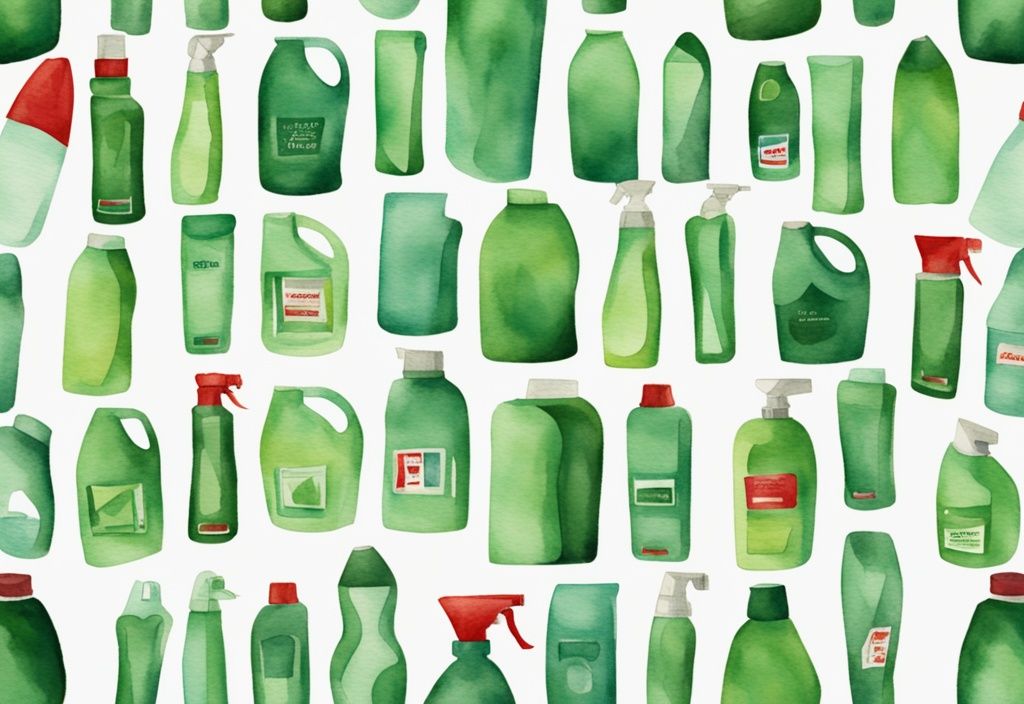


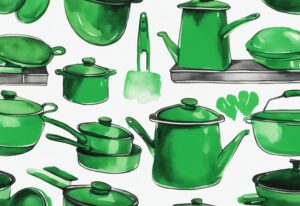



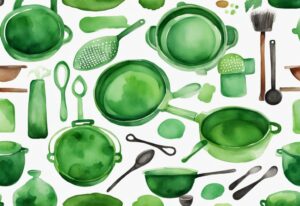
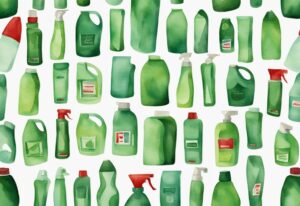


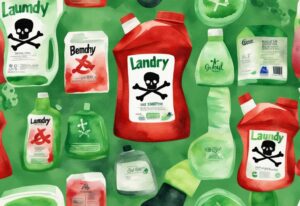

Post Comment